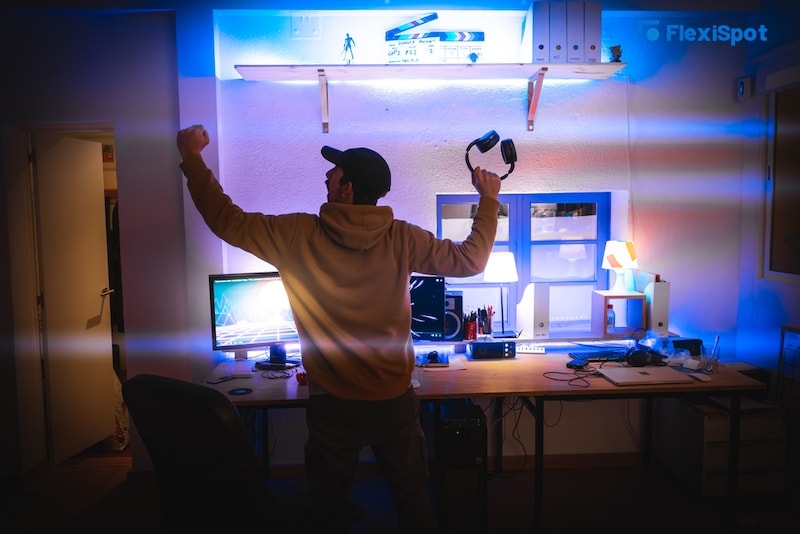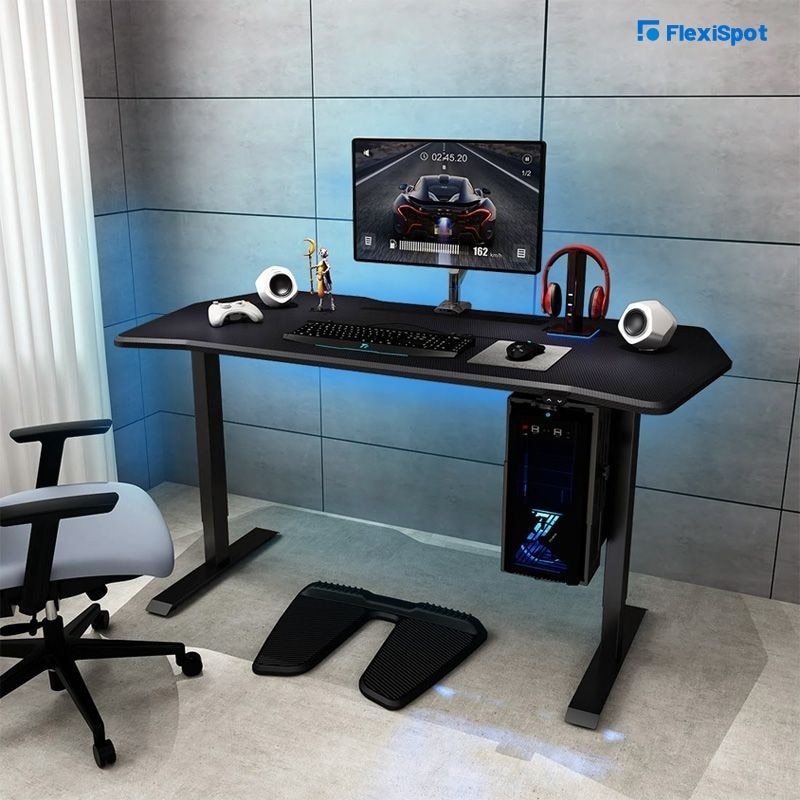
Anyone who has ever played a video game can attest to the fact that they can be incredibly immersive and addicting. But what most people don't realize is that there can be some serious health consequences to spending too much time gaming. From weight gain and poor vision to carpal tunnel and social isolation, there are a number of ways that gaming can take a toll on our physical and mental health. Some games also contain graphic or violent content that can trigger anxiety or other mental health issues.
Though there are some risks associated with gaming, it's important to remember that the vast majority of gamers are able to enjoy their hobby without any negative consequences. In fact, gaming can also have some positive effects on our health. For instance, certain games can help improve our cognitive skills and memory, and multiplayer games can encourage teamwork and social interaction.
In this blog post, we'll take a look at some of the effects that gaming can have on your health. We'll also discuss ways to minimize these risks and stay healthy while gaming. So, whether you're a hardcore gamer or just someone who likes to play occasionally, read on for tips on how to keep your health a top priority!
Benefits of Gaming
For years, adults have widely criticized gaming as a waste of time. However, there are actually many benefits to moderate gaming, which include:
Improved Cognitive Abilities
One of the key cognitive benefits is enhanced visuospatial skills. It’s visuospatial skills that help us navigate around, gain perception of distance, and even drive around. Visuospatial abilities enable us to recognize and remember objects in relation to other objects. Gaming improves visuospatial skills, which helps gamers in everyday activities and in other settings.
Better Problem Solving Skills
Many video games involve completing missions, making strategic moves to complete a level, or filling in a puzzle. Avid gamers hone their ability to think on their toes. A study conducted in 2013 showed that video games, especially those that involve shooting targets, have a positive effect on seeing things in three dimensions- an important skill in problem-solving.
Another study in China revealed increased gray matter in frequent gamers. There was increased connectivity in the brain’s insular cortex region. The effects of solving problems in video games translated to application of these skills in academic and professional settings.
Enhanced Memory
Memory encoding and retrieval get better with increased generation of nerve cells in the brain, and new environments trigger the generation of nerve cells. Enriched environments such as the situations in games offer novel stimuli, increasing nerve cell generation. People who work outside get the required stimuli by encountering many new environments but people who are mostly indoors may lack novel stimuli. Playing video games can be beneficial because it provides stimulation useful in enhancing memory.
Reduced Stress
For many people doing something they enjoy serves as a stress reliever. Gaming helps the players boost their mood and has also been used to treat depression. Engaging in different games helps gamers focus their attention on something else and engage in mentally beneficial activities.
Improved Multi-tasking
Video games can also help gamers become better multitaskers. As people age, it becomes easier to focus on several tasks at a time. Playing video games designed to improve this skill enables people of all ages to handle multiple activities. Racing games typically involve controlling the car, driving across different game terrains, and avoiding obstacles. All these activities seemingly occur at the same time forcing players to pay attention to different things simultaneously.
Side Effects of Gaming
We all know that too much of anything is bad for you. But what about gaming? Surely spending a few hours slaying dragons or building virtual cities can't be that harmful, right? Well, actually, it turns out that gaming can have some adverse effects on your health. Here are a few things to keep in mind about the health effects of gaming the next time you sit down for a marathon gaming session.
Muscle Pain
Gamer's pain is an actual condition that can affect anyone who plays video games for an extended period of time. Carpal tunnel, gamers thumb, tennis elbow, gaming shoulder, and tendonitis are all common forms of pain that can be caused by gaming. The repetitive motions required to play many video games can put a strain on the muscles and tendons in your hand, wrist, and elbow, leading to inflammation and pain. In addition, looking up or down at a TV or computer console can lead to neck and back pain. While gamers' pain is often manageable with over-the-counter medication and rest, it can be a serious condition that requires medical treatment.
Obesity
Most people know that there are certain health risks associated with being obese. These risks include high blood pressure, heart disease, stroke, and diabetes. What many people don't realize, however, is that gaming can actually be a contributing factor to obesity.
It's no secret that gaming can be pretty sedentary. After all, it usually involves sitting in one spot for extended periods of time. And while there's nothing wrong with a little bit of couch time, too much can lead to weight gain and obesity. In fact, studies have shown that people who spend a lot of time gaming are more likely to be obese than those who don't.
There are a few reasons why this is the case. First, when you're engaged in gaming, you're not moving your body. This means that you're not burning any calories. Second, gaming often goes hand-in-hand with snacking. And since most snacks are high in calories and fat, this can lead to weight gain.
Vision Issues
According to the Vision council, about 80% of American adults report using digital devices for more than two hours every day. And as the use of computers, tablets, and smartphones has become increasingly commonplace, so are the reports of vision problems. One of the most common complaints is digital eye strain and computer vision syndrome (CVS), which describes a group of symptoms that can occur after spending extended periods of time looking at screens and can be exacerbated by poor lighting conditions and an incorrect viewing distance. These symptoms include blurred vision, headaches, dry eyes, and eye strain. While CVS is not a permanent condition, it can cause significant discomfort and can impact productivity.
Gaming can also cause "dry eye," a condition in which the eyes do not produce enough tears to keep them lubricated. This can lead to discomfort, eye redness, and even temporary vision loss. In extreme cases, prolonged gaming sessions have been linked to more serious conditions like nearsightedness and macular degeneration.
The screen's brightness can cause eye fatigue, while the close distance can lead to eye strain. In addition, gaming often involves rapid movements, which can cause the eyes to become less focused and result in blurry vision.
Suicidal Thoughts
It's no secret that some video games can be extremely violent. From first-person shooters to horror games, there are plenty of titles that rely on graphic violence to tell their stories. While there's no denying that these games can be entertaining, there's also no denying that they can have a serious impact on players' mental health. In fact, research has shown that playing violent video games can actually lead to suicidal thoughts.
One of the biggest risk factors for suicide is impulsivity, and studies have shown that playing violent video games can increase impulsive behavior and pain tolerance in players. This is because violent games desensitize players to violence, making them more likely to engage in risky behavior. Additionally, games like these often reward players for taking risks and being aggressive, which further encourages this behavior. There are also instances where the games allow you to “respawn” after death, which adds to the risk-taking behaviors of the gamer in real life. This can normalize death and make it seem like an acceptable solution to problems
It is important to note that most people who play video games do not develop suicidal thoughts or engage in self-destructive behavior. However, for those who are already at risk for suicide, gaming may provide a means of escape from reality or an opportunity to act out fantasies of self-harm.
Sleep Deprivation
How does gaming cause sleep deprivation? The blue light emitted by screens can disrupt the production of melatonin, the hormone that helps regulate our sleep cycle. This in turn lengthens the time it takes to fall asleep and reduces the amount of deep-stage sleep we get each night. In addition, gaming often occurs in a stimulating environment (e.g., with noise and bright lights), leading to mental and physical arousal, which can further delay sleep onset and reduce sleep quality. As a result, gamers may find themselves feeling tired during the day and may even experience symptoms of fatigue
Addiction
For some people, gaming provides a way to escape from reality and enter into a fantasy world where they have control over their surroundings. For others, the thrill of competition and the sense of accomplishment that comes with winning can be extremely addictive. Whatever the reason, once someone becomes addicted to gaming, it can be very difficult to break the habit.
So how does gaming cause addiction? Essentially, it all comes down to the release of dopamine in the brain. When we do something that feels good, our brain releases dopamine, which makes us feel happy and motivated. And because video games are designed to be enjoyable and engaging, they trigger this release of dopamine on a regular basis. Over time, our brains become used to this continuous influx of dopamine, leading to hyperarousal while playing video games. This heightened state of arousal makes us feel more alert and alive, and it can be very difficult to walk away from.
Social Isolation
When you're used to spending all your time alone in front of a screen, it can be hard to relate to people in the real world. You may start to feel like you don't have anything in common with anyone else. This can lead to feelings of loneliness and depression. In severe cases, social isolation can even lead to suicidal thoughts.
How to Avoid the Possible Health Risks of Gaming
Like anything else in life, there are some risks associated with gaming. However, by being aware of these risks and taking some simple precautions, you can minimize the chances of them having a negative impact on your life. Here are just a few tips to get you started:
Game in Moderation and Take Regular Breaks
According to experts, adults should limit their screen time (including gaming) to no more than two hours per day. However, for many, that’s not realistic. If you are an avid gamer, there are steps you can take to decrease the potential health risks that come with gaming. First, make sure your game is in moderation. Set limits on the number of hours you can play in a day (ideally a Max of 2 hours), and make sure to engage in other activities outside of gaming like exercising and socializing.
Second, take a break every 20 minutes or so to walk around and stretch. By taking breaks, you give your body a chance to recover from the physical demands of gaming. You can also try following the 20-20-20 rule: every 20 minutes, take a 20-second break to look at something 20 feet away. This will help prevent eye strain and give you a much-needed breather.
Lastly, In addition to physical problems, gaming can also lead to mental health issues such as anxiety and depression. If you find yourself feeling irritable or isolated after gaming, it’s important to take a step back and reassess your hobby.
Use Ergonomic Furniture
People often think of ergonomic furniture as being for people who work in an office, but it can also be very helpful for gamers. Poor posture and prolonged periods of sitting or standing in the same position can lead to muscle strain, discomfort, and even serious injuries. Ergonomic furniture can help to alleviate these problems by ensuring that gamers are able to maintain a comfortable and correct posture while gaming.
Some of the ergonomic furniture you can include to transform your gaming setup include:
Gaming Seats
Ergonomic Gaming seats are designed to provide support and promote proper posture, which can help to reduce muscular strain and prevent long-term damage. In addition, gaming seats often come equipped with features like armrests, proper lumbar support, and built-in massagers and speakers, which can help to further improve comfort levels.
Sit and Stand Desks
One of the biggest dangers of gaming is that it encourages a sedentary lifestyle. Coupled with a lack of physical activity, too much time spent sitting down can lead to a host of health problems, such as obesity, heart disease, and diabetes.
So If you're looking for a way to stay healthy while you game, a sit-stand desk is a great option. By allowing you to alternate between sitting and standing positions, it can help reduce the risk of developing musculoskeletal problems and sedentary lifestyle diseases. This simple change can have a profound impact on health. In addition to reducing the risks associated with a sedentary lifestyle, sit-stand desks can also help to improve posture by allowing you to adjust the height of the desk to the recommended height while sitting relieving strain on your neck and back.
Monitor arms
Gaming monitors are typically placed on desks at a height that is not ideal for ergonomic comfort, which can lead to neck and back pain and eye strain One way to help avoid these health risks is to use a monitor arm. A monitor arm allows you to adjust the position of your screen to better suit your needs, and it also frees up desk space so that you can have a more comfortable setup.
Ergonomic Mice and Keyboards
If you spend a lot of time gaming, you may be at risk of developing carpal tunnel syndrome or other repetitive strain injuries. Ergonomic keyboards and mice can help prevent these problems by keeping your hands and wrists in a more natural position compared to traditional options, which means you can game for longer periods of time without feeling soreness or discomfort.
In addition, many ergonomic gaming accessories come with built-in features that can help to improve gameplay. For example, some gaming mice come with buttons that can be programmed to perform specific in-game actions, making it easier to execute complex moves.
Proper Lighting
Proper lighting is essential for avoiding eye strain and other vision-related issues. Glare and reflections on the screen can quickly lead to headaches and eye strain while playing in a dark environment can cause your eyes to work overtime in order to process the information on the screen.
One way to avoid these problems is to make sure that your gaming setup is in a well-lit room. If possible, position and adjust your screen so that there is little to no glare, and use a softer light source such as an LED lamp if you are playing in a darker environment. Additionally, you should adjust the brightness of your screen to the perfect setting, so that it is not too bright or too dark for your eyes.
Finally, consider investing in blue-light filtering glasses. These can help to reduce the amount of blue light that your eyes are exposed to, making it easier for you to game for longer periods of time without experiencing any vision-related issues
Drink Plenty of Water and Healthy Snacks
Gaming for long sessions without taking water can cause dehydration. Not only does it make it easy to forget to drink water, but the body also loses fluids through sweating and respiration. As a result, gamers are at risk for dehydration, which can lead to a host of health problems including headaches and fatigue. One way to avoid these problems is to make sure to drink plenty of water while gaming.
Gamers tend to snack on high-calorie foods that can lead to obesity and other lifestyle diseases. Fortunately, there are now many healthy snack options available that are specifically designed for gamers. Eating healthy snacks like fresh fruit and vegetables, whole grain toast, or yogurt can help you stay focused and energized while you're playing.
If you find yourself snacking a lot while you game, try to make healthier choices like those listed above instead of processed foods or sugary treats. Not only will this help keep your energy levels up and your waistline trim, but it will also help keep your immune system strong
Is Gaming Bad for Your Health?
So, what do all of these mean for gamers? Are video games bad for your health? The simple answer is no. It appears that the effects of gaming on your health depend on a variety of factors, including how often you play, activities you partake in during the session, and what type of games you are playing. Overall, it seems that moderate amounts of gaming can be beneficial for your mental health, but too much screen time can have negative consequences.
However, as long as you maintain a healthy lifestyle and avoid the addiction that comes along with gaming, then the positive effects of gaming will outweigh the negative. Moderation is also key when it comes to gaming, and you should make sure to take breaks often. If you’re a gamer, be sure to keep an eye on your physical and mental health, and if you see any signs that gaming might be having a negative effect on you, take a break.
Finally, it is important to set up a healthy gaming environment in order to avoid any negative health effects. A healthy gaming environment includes using a comfortable gaming chair in combination with a height adjustable desk to prevent instances of sedentary lifestyle, maintaining good posture, taking breaks, and getting enough sleep. By following these tips, you can maximize the positive health effects of gaming while minimizing the risks.





